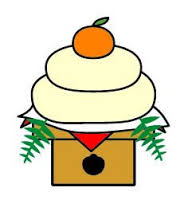 |
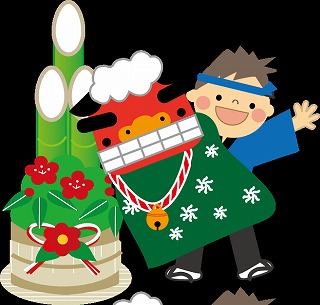 |
| Today, I'm talking about new year's memories in my childhood. | |
| 今日は私の子供の頃のお正月の思い出について話そうと思います。 | |
| The preparation started on December 29th. | |
| お正月の準備は12月29日から始まりました。 | |
| Lots of rice-cakes were delivered to my house from the rice-cake shop. |
|
| たくさんのお餅がお餅屋さんから家に配達されてきました。 | |
| I had a large family, father, mother, youngerbrother, grandfather, grandmother, 2 uncles, and me, 8 members. |
|
| 私の家族は大きい家族でした、父、母、弟、2人のおじ、そして私の8人家族でした。 | |
| There are 3 kinds of ricecakes. |
|
| 3種類のお餅がありました。 | |
| Simple ricecakes, it's called "shiro-mochi". | |
| 何も入っていないお餅は”白もち(しろもち)”と言います。 | |
| Black soybeans ricecakes, it's called "mame-mochi". | |
| 黒豆が入っているお餅は”豆もち”と言います。 | |
| Seaweed ricecakes, it's called "konbu-mochi". |
|
| 海藻(昆布)が入っているお餅は”昆布もち”と言います。 | |
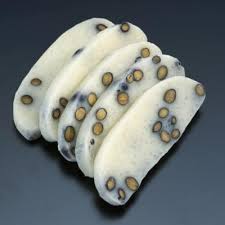 mame-mochi |
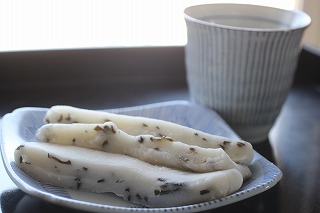 konbu-mochi |
| My mother didn't boil rice during new year for a week. | |
| 私の母はお正月の間、1週間、ご飯を炊きませんでした。 | |
| In Japan, the principal food is rice. | |
| 日本では、主食は米です。 | |
| But the principal food is ricecake at the new year. | |
| しかし、お正月には主食がお餅なのです。 | |
| Do you know why? | |
| 何故だかわかりますか? | |
| In the old days, boiling ricecake is hard work because there was not rice-machine. |
|
| 昔は炊飯器がなかったので、ご飯を炊くことは大変な仕事だったのです。 | |
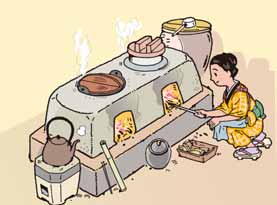 |
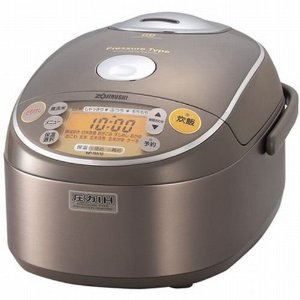 |
| So that means, ricecake was for taking a rest of mother. |
|
| つまり、お餅はお母さんがお休みをとるためのものだったのです。 | |
| There were so many ricecakes, so we had to rent a ricecake cutter from handware store. |
|
| とてもたくさんのお餅があったので、金物屋さんからお餅のカッターを借りなければなりませんでした。 | |
| The cutter was a kind of bread cutter, but it was hand-operated. | |
| そのカッターはパンのカッターのようなものでしたが、手動でした。 | |
| I always said, "Let me do it." | |
| 私はいつも言いました。「私にさせて」 | |
| It was fun for child me. | |
| それは子供の私にとっては、面白かったのでした。 | |
| I got the knack for doing step by step. | |
| 私は少しずつ、そのコツを覚えました。 | |
| knack(ナック) コツ |
|
| My granpa made soup stock of ozouni from dry-cattlefish and seaweed konbu. | |
| 私のおじいちゃんはスルメと海藻の昆布から、お雑煮のだしをとりました。 | |
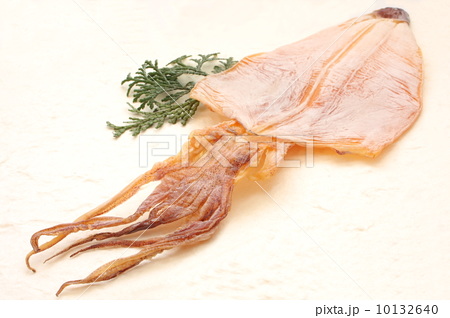 This is a dry cattlefish called Surume. これはするめという干したイカです。 |
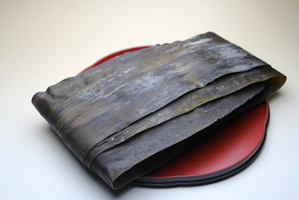 This is a seaweed called Konbu. これは昆布という海藻です。 |
| You know, ozouni of Kanazawa is the most simple one all over the Japan. | |
| ご存知の様に、金沢のお雑煮は日本で一番シンプルです。 | |
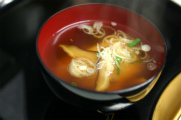 This is Kanazawa ozouni. これは金沢のお雑煮です。 The topping is only green onion. 上にのせるものはネギだけです。 |
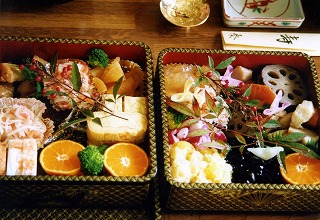 This is Osechi made myself. これは手作りのおせちです。 |
| In Kanazawa, the topping of ozouni is only leek, but in most place , it is gorgeous food. |
|
| 金沢ではお雑煮のトッピングはネギだけですが、ほとんどの地方では豪華なトッピングをのせます。 | |
| And finally the New Year's Day was coming. | |
| そしてついにお正月がやってきました。 | |
| 50 years ago , no one walked the street during new year, the town was very very quiet. |
|
| 50年前はお正月の間は誰も通りを歩いていませんでした、町はとてもとても静かだったんです。 | |
| In Japan, we express quiet "Shi〜n". I love various onomatopoeia in Japan. |
|
| 日本では、静かなことを「シ〜ン」と表現します。 私は日本のいろいろな擬音語が大好きです。 |
|
onomatopoeia(オナマトピーア) 擬音語 |
|
| All the shops closed , all the people stayed in home with family. | |
| 全てのお店は閉まっていて、人々は家で家族と過ごしていました。 | |
| And now some shops open from Janually 1st. | |
| でも現在では、いくつかのお店は1月1日から開いています。 | |
| It's quite different. | |
| かなり違いますね。 | |
| My cousin (father's sister's son) came to our house every new year. | |
| 私のいとこは毎年、お正月に私たちの家に来ました。 | |
| He taught me how to spin a top. | |
| 彼は私にこまの回し方を教えてくれました。 | |
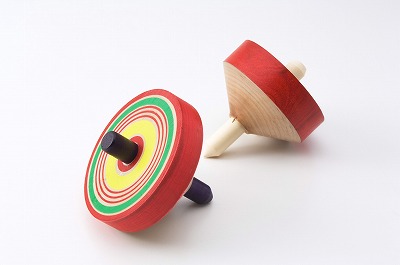 |
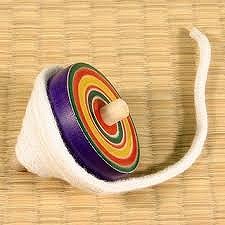 |
| Because of him, I could spin a top on my palm. | |
| 彼のお蔭で、私は手のひらでこまを回せるようになりました。 | |
| We played Karuta, Bozumekuri, Sugoroku, Cards, Diamond-game, Fukuwarai, Koma, and so on for a all day. |
|
| 私たちは一日中、カルタや坊主めくり、すごろく、トランプ、ダイヤモンドゲーム、福笑い、コマなどをして遊びました。 | |
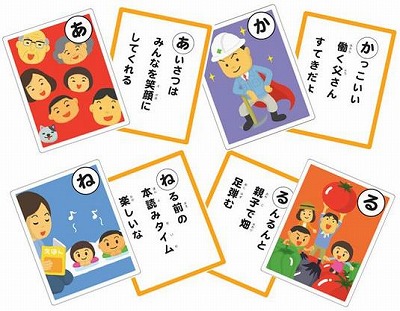 Karuta カルタ |
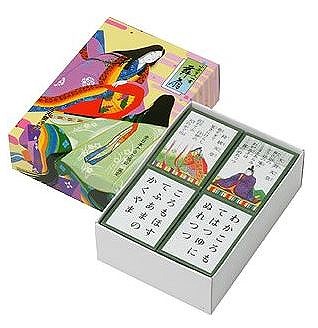 Bozumekuri 坊主めくり |
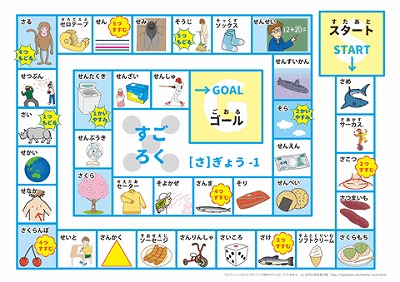 Sugoroku すごろく |
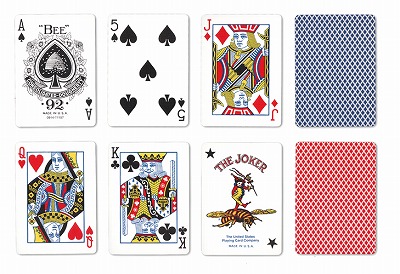 Cards トランプ |
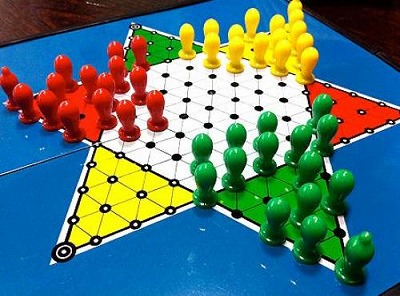 Diamond game ダイヤモンドゲーム |
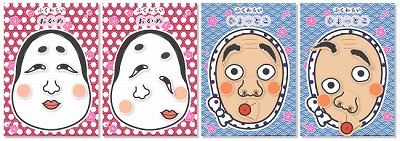 Fukuwarai 福笑い |
| Our grandma broiled the ricecakes by charcoal for us. | |
| おばあちゃんは私たちに炭でお餅を焼いてくれました。 | |
| broil 直火で焼く charcoal(チャコール) 炭 |
|
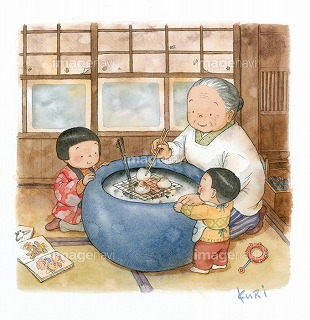 |
|
| Charcoal smelled good. | |
| 炭はいい匂いがしました。 | |
| The scene is fresh in my memory. | |
| その情景は今も私の記憶に新しいです。 | |
 |
|
| 2015年1月22日(木) | トップページへ戻る |